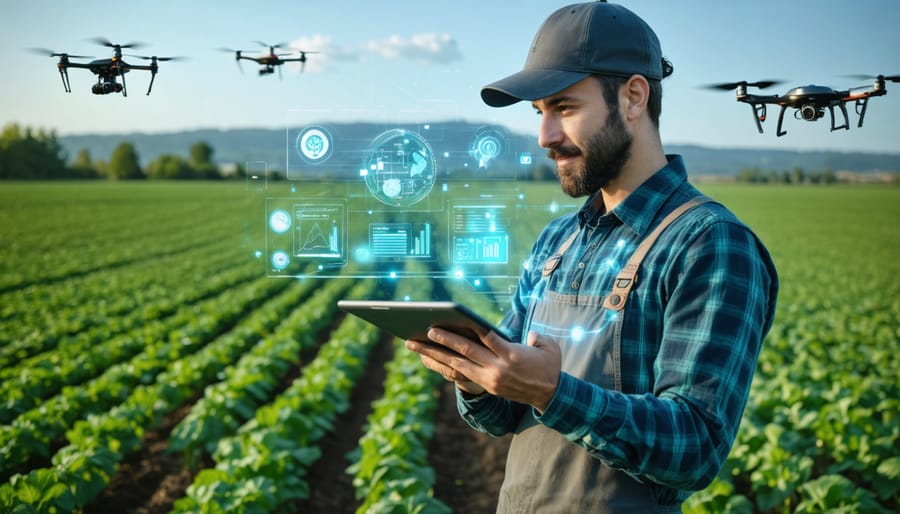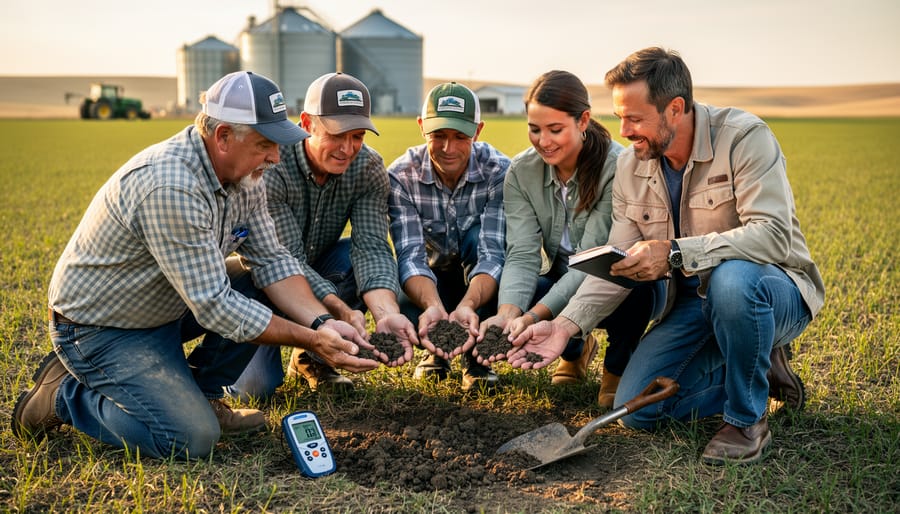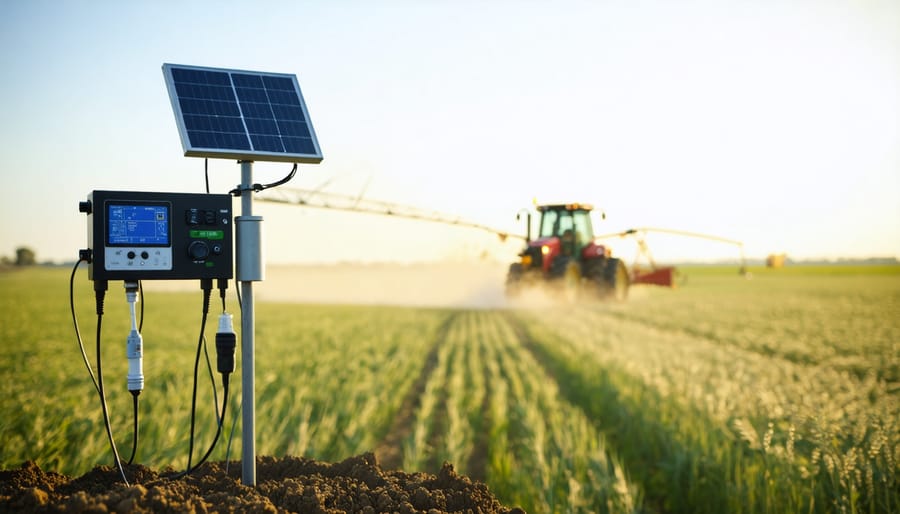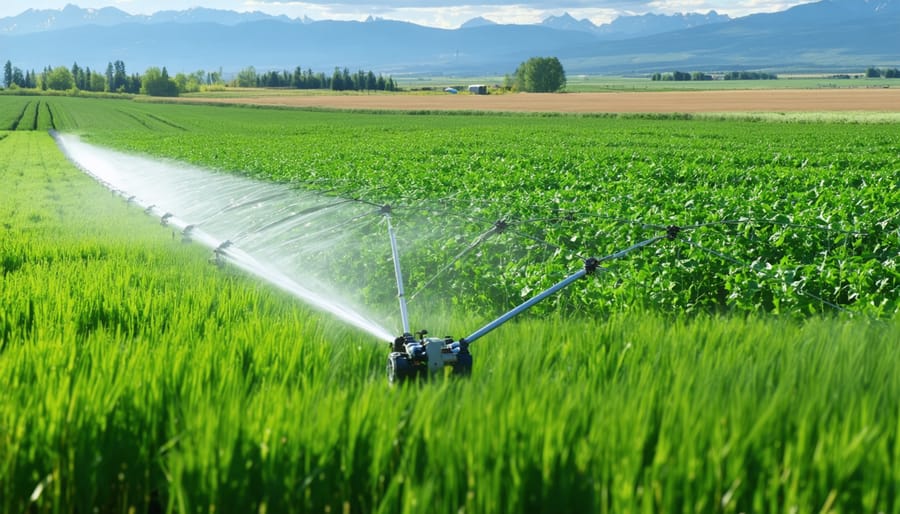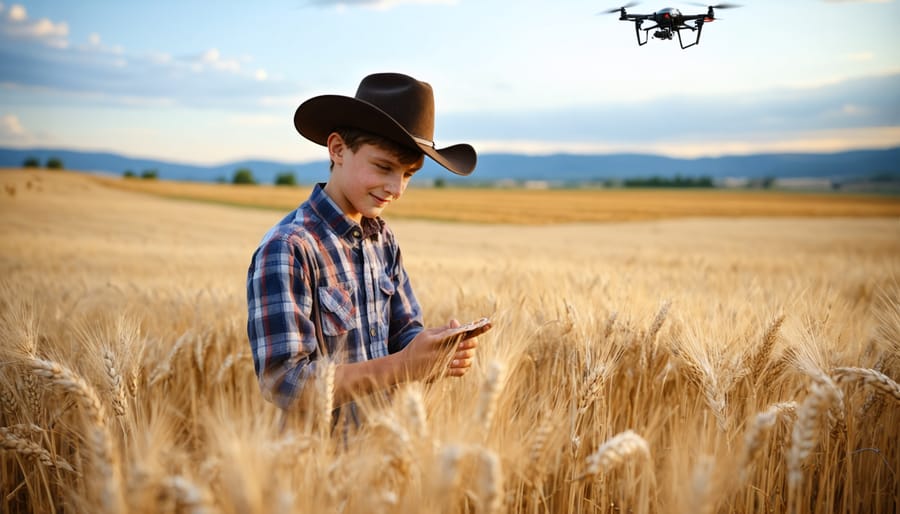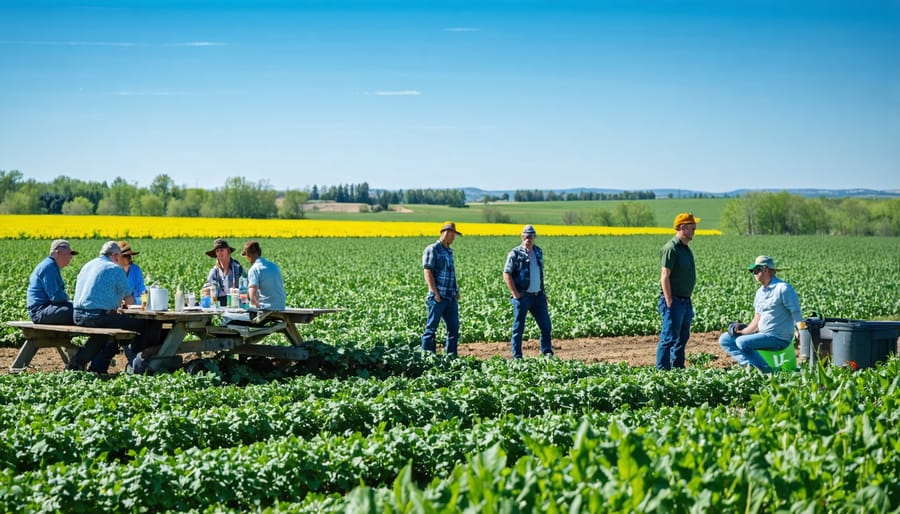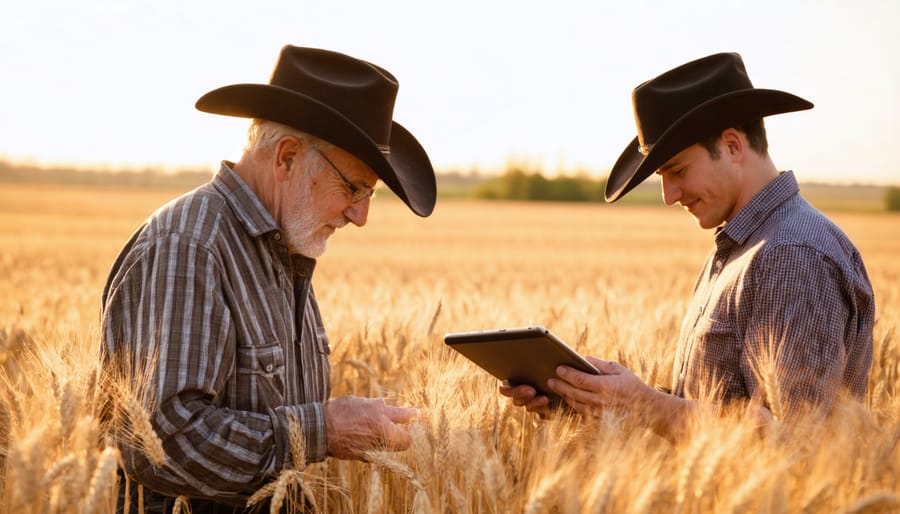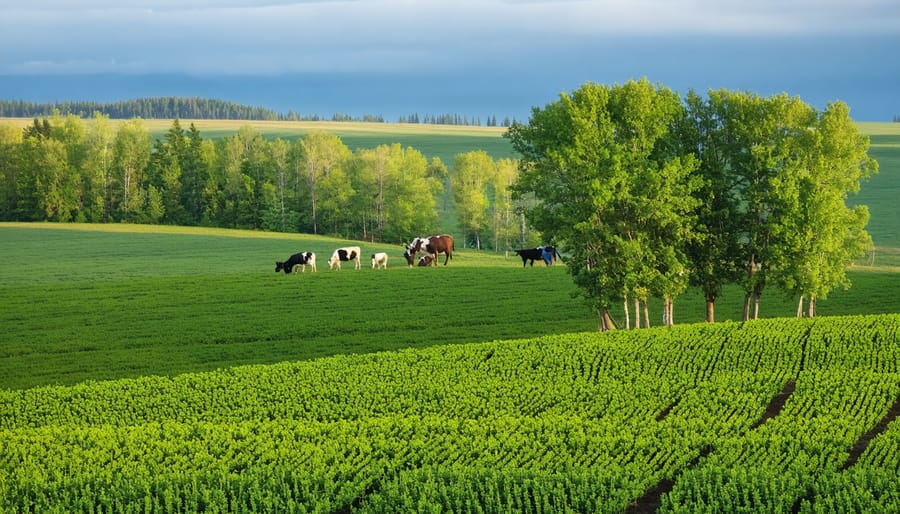Digital literacy drives modern agriculture’s success, empowering farmers to harness data-driven decisions and innovative technologies that are transforming Alberta’s agricultural landscape. From precision farming applications to smart irrigation systems, today’s agricultural operations demand a new set of digital competencies that bridge traditional farming wisdom with technological advancement.
Our comprehensive digital literacy program equips producers with essential skills needed to navigate the digital agricultural ecosystem, focusing on practical applications that enhance productivity and sustainability. Through hands-on training, peer-to-peer learning networks, and expert-led workshops, participants develop confidence in implementing digital solutions while maintaining connection to their farming heritage.
This initiative responds directly to the growing need for digital proficiency in Canadian agriculture, where data management and technological integration have become as fundamental as soil health and weather patterns. By combining local agricultural expertise with digital innovation, we’re building a resilient farming community ready to embrace the opportunities of modern agriculture while preserving the values that have long defined Canadian farming.
The Digital Revolution in Canadian Agriculture
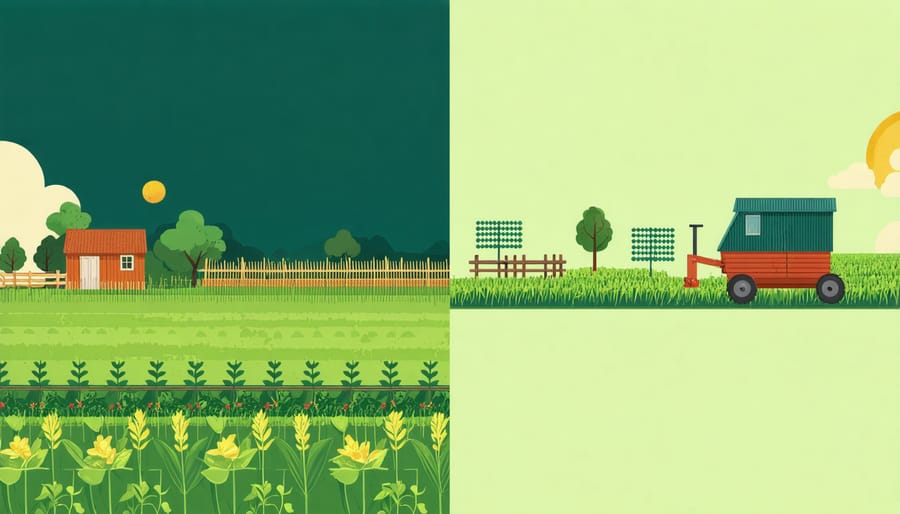
Current Digital Challenges in Alberta’s Farming Community
Alberta’s farming community faces several distinct digital challenges as agriculture becomes increasingly technology-driven. Recent surveys indicate that 45% of local farmers struggle with reliable internet connectivity, particularly in remote areas of the province, limiting their ability to implement precision farming techniques and access real-time market data.
Data management presents another significant hurdle, with many farmers reporting difficulties in effectively utilizing farm management software and digital record-keeping systems. The rapid pace of technological advancement means that equipment and systems quickly become outdated, creating both financial and operational challenges for farm businesses.
Skills gaps are especially noticeable in areas such as drone operation, GPS-guided equipment handling, and data analytics. Many experienced farmers express frustration with the learning curve associated with new digital tools, while younger farmers often seek more advanced training in emerging agricultural technologies.
Weather monitoring systems and smart irrigation controls, though potentially game-changing for water conservation, remain underutilized due to implementation complexities and training needs. The integration of these technologies with existing farm operations requires specialized knowledge that isn’t readily available in many rural communities.
The Economic Impact of Digital Agriculture
Digital literacy in agriculture directly translates to improved farm productivity and economic gains. Recent studies from Alberta’s agricultural sector show that farmers who embrace digital tools see an average 15-20% increase in crop yields and a 12% reduction in input costs. These improvements stem from precise resource management, data-driven decision-making, and enhanced market access.
Smart farming technologies, when properly implemented, help producers optimize irrigation schedules, reduce pesticide usage, and better predict weather patterns. For example, the Thompson family farm in Red Deer reported a 25% decrease in water consumption after implementing digital monitoring systems, resulting in substantial cost savings.
The economic benefits extend beyond traditional farming to urban agriculture initiatives, where digital tools help maximize limited space and resources. Data from the Alberta Agricultural Digital Transformation Initiative shows that farms utilizing digital platforms for direct-to-consumer sales increased their revenue by an average of 30% during the past two years.
Moreover, digitally literate farmers are better positioned to access new markets, manage supply chains, and participate in e-commerce platforms. This connectivity has proved especially valuable during market disruptions, allowing producers to maintain profitability through diversified sales channels and improved inventory management.
Core Components of Agricultural Digital Literacy
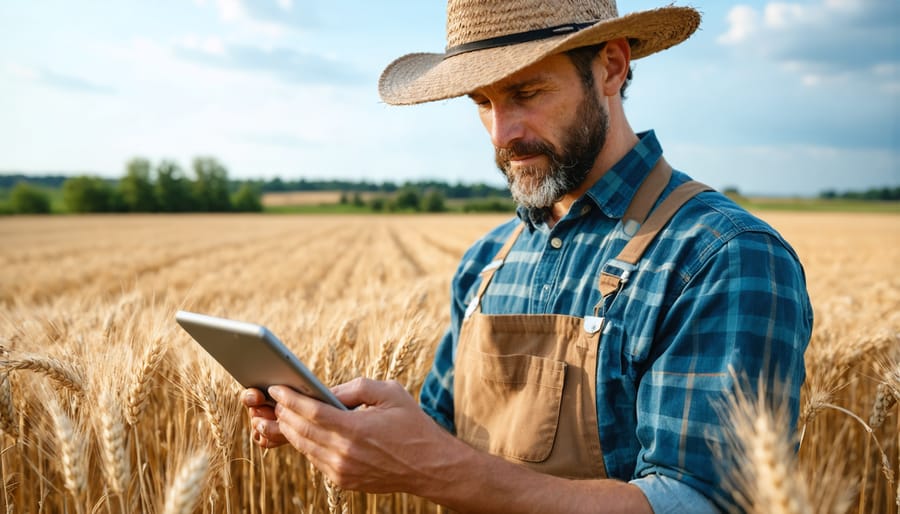
Smart Farming Technologies
Modern farming has evolved beyond traditional methods, embracing precision agriculture tools that enhance efficiency and sustainability. GPS-guided tractors now navigate fields with centimetre-level accuracy, while soil sensors provide real-time data on moisture levels, nutrient content, and pH balance. These technologies help farmers make informed decisions about irrigation, fertilization, and crop management.
Farm management software has become essential for daily operations, allowing farmers to track everything from equipment maintenance to crop yields. Popular platforms like AgriApp and FarmCommand help organize field data, manage inventory, and monitor weather patterns. Many Alberta farmers are finding success with these digital tools, reporting up to 20% reduction in input costs and 15% increase in yield efficiency.
Drone technology has revolutionized field monitoring, enabling farmers to survey hundreds of hectares in a fraction of the time it would take on foot. These aerial systems, equipped with multispectral cameras, can detect early signs of pest infestation, disease, or nutrient deficiency. Local farming cooperatives often share drone resources, making this technology more accessible to smaller operations.
Mobile apps are increasingly vital for modern farming. Weather forecasting apps, pest identification tools, and market price trackers put crucial information at farmers’ fingertips. Many Alberta agricultural extension services now offer virtual consulting through video conferencing, allowing farmers to get expert advice without leaving their fields.
Remember, these technologies are tools to enhance, not replace, farming expertise. The key is selecting solutions that fit your operation’s specific needs and scale.
Data Management and Analysis
Modern farming success increasingly depends on effective data management and analysis skills. By learning to collect, organize, and interpret farm data, you can make more informed decisions about your operations. Start by identifying key data points relevant to your farm, such as soil conditions, weather patterns, yield rates, and input costs.
Digital tools like farm management software help streamline data collection through automated sensors and mobile apps. These systems can track everything from equipment maintenance schedules to crop rotation patterns, making it easier to spot trends and optimize operations.
Learning to analyze this data is equally important. Begin with basic spreadsheet skills to track expenses and yields, then progress to more advanced analytics that can help predict optimal planting times or identify potential issues before they become problems. Many agricultural extension services in Alberta offer workshops on using common data analysis tools tailored specifically for farm applications.
Consider joining local farmer networks that share data management practices. For example, several farming cooperatives in Central Alberta have established data-sharing initiatives, allowing members to benchmark their performance and learn from each other’s experiences.
Remember to maintain good data security practices by regularly backing up your information and using strong passwords for your digital tools. Creating a systematic approach to data collection and analysis might take time initially, but the long-term benefits in improved decision-making and operational efficiency are well worth the investment.
Digital Communication and Marketing
In today’s digital age, effective online communication and marketing have become essential tools for agricultural success. Alberta farmers are increasingly leveraging social media platforms, websites, and digital marketplaces to connect directly with consumers and expand their market reach. These platforms offer unprecedented opportunities to showcase farm products, share farming practices, and build meaningful relationships with customers.
Popular platforms like Instagram and Facebook allow farmers to tell their story through photos and videos, giving consumers a behind-the-scenes look at daily farm operations. Many successful Alberta producers are using these channels to educate consumers about sustainable farming practices while promoting their products. Local success stories include the Red Deer Valley Organic Farm, which built a thriving community of over 5,000 followers by sharing weekly harvest updates and cooking tips.
Email marketing remains a powerful tool for maintaining customer relationships. Regular newsletters keep customers informed about seasonal availability, special offers, and farm events. Digital marketplaces and online ordering systems have also become crucial, especially since the pandemic, enabling farmers to reach customers beyond their local area.
Community engagement through digital platforms has proven particularly valuable for organic and specialty crop producers. Online forums and agricultural social networks provide spaces for knowledge sharing, problem-solving, and building professional connections. These platforms also offer opportunities to participate in virtual farmers’ markets and agricultural events, expanding reach while reducing traditional marketing costs.
Success Stories: Digital Transformation in Alberta Farms
Case Study: The Thomson Family Farm
Located just outside of Red Deer, Alberta, the Thomson Family Farm’s journey into digital agriculture began three years ago when Sarah Thomson realized their traditional record-keeping methods weren’t keeping pace with their expanding operations. The 800-hectare mixed farming operation, run by Sarah and her husband Mike, alongside their two children, faced challenges in tracking crop rotations, livestock management, and equipment maintenance.
“We were drowning in paper records and Excel sheets,” Sarah recalls. “Something had to change if we wanted to stay competitive and efficient.”
The Thomsons enrolled in a local digital literacy program, which taught them essential skills in farm management software, GPS technology, and digital record-keeping. Within six months, they implemented a comprehensive digital system that transformed their operations.
The results were remarkable. Their new digital tools helped reduce input costs by 15% through precise application of fertilizers and pest control. Equipment maintenance schedules, managed through a mobile app, decreased downtime by 30%. Perhaps most significantly, their children became more engaged in the family business, bringing fresh perspectives on technology integration.
“The learning curve was steep,” Mike admits, “but the support from our local agricultural extension office made the transition manageable. Now we can’t imagine farming any other way.”
The Thomsons now mentor other local farmers, sharing their experience and encouraging digital adoption within their community. Their story demonstrates how embracing digital literacy can enhance both productivity and family farm succession planning.
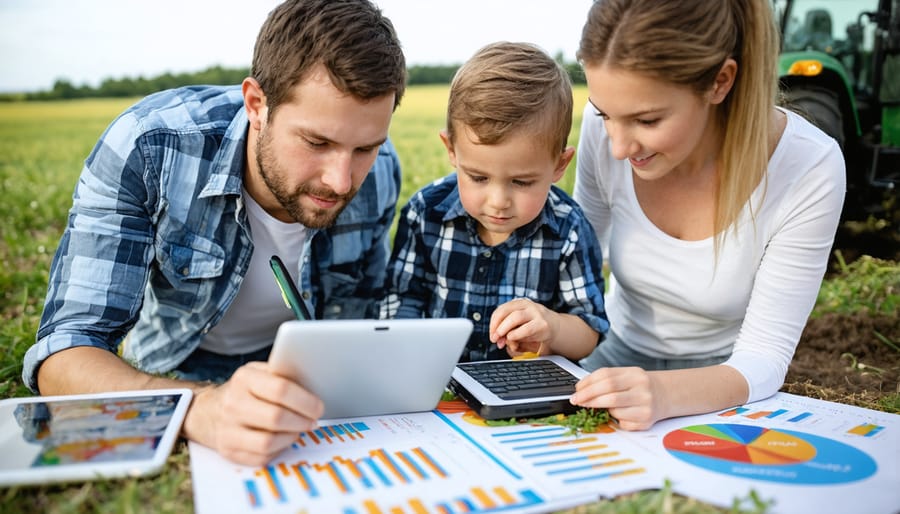
Community Learning Initiatives
Across Alberta, farmers are coming together to share digital knowledge and resources through innovative community farming programs and local initiatives. The Agriculture Technology Learning Hub in Red Deer offers weekly workshops where experienced farmers mentor others in using farm management software and precision agriculture tools. These sessions provide hands-on experience with digital tools while building valuable community connections.
Local libraries have stepped up to support rural digital literacy by offering dedicated computer stations with agricultural software and high-speed internet access. The Mobile Digital Skills Unit, a converted bus equipped with laptops and satellite internet, travels to remote farming communities, ensuring that distance isn’t a barrier to digital learning.
The Alberta Agricultural Digital Mentorship Program pairs tech-savvy farmers with those looking to enhance their digital skills. This peer-to-peer learning approach has proven particularly effective, with mentors sharing practical experience in implementing digital solutions for real farm challenges.
Several agricultural societies have established Digital Learning Circles, where farmers meet monthly to discuss new technologies, share success stories, and troubleshoot common technical issues. These gatherings often feature demonstrations of new apps and tools, creating an informal but effective learning environment that respects traditional farming knowledge while embracing digital innovation.
Regional agricultural offices also provide one-on-one support sessions, helping farmers navigate specific digital challenges related to their operations. This personalized approach ensures that digital literacy training aligns with individual needs and farm-specific requirements.
Getting Started with Digital Literacy
Available Training Programs
Alberta farmers can access a diverse range of digital literacy training programs designed to enhance their agricultural operations. The Agriculture and Agri-Food Canada (AAFC) offers comprehensive online courses covering essential digital skills, from basic computer operation to advanced farm management software. These self-paced programs allow farmers to learn while maintaining their busy schedules.
Local agricultural colleges, including Olds College and Lakeland College, provide hands-on workshops focusing on precision agriculture technologies and data management. These institutions have become hubs for local agricultural innovation, offering both in-person and virtual learning opportunities.
The Alberta Farm Extension Network delivers regional training sessions throughout the province, bringing digital literacy education directly to farming communities. Their mobile learning labs feature practical demonstrations of farm management apps, GPS systems, and digital record-keeping tools.
For those preferring online learning, the Canadian Agricultural Partnership offers free webinars and virtual workshops focusing on digital adoption in agriculture. Topics include social media marketing for farm businesses, e-commerce platforms, and cybersecurity basics.
The Digital Agriculture Literacy Initiative, a collaboration between agricultural associations and tech companies, provides mentorship programs where experienced farmers share their digital transformation journeys with peers. These programs emphasize practical implementation and community support, ensuring farmers can confidently integrate digital tools into their daily operations.
Building Your Digital Tool Kit
Getting started with digital tools doesn’t have to be overwhelming. Start with these essential applications that many Alberta farmers are already using successfully in their operations. A reliable smartphone or tablet serves as your foundation, allowing you to access critical information wherever you are on your property.
Begin with weather monitoring apps like WeatherFarm or WeatherCAN, which provide localized forecasts crucial for planning field operations. For record-keeping, consider user-friendly apps like AgriMap or SimpleBooks – both popular choices among local farmers for tracking expenses, yields, and field activities.
Communication tools are equally important. WhatsApp or Zoom help you stay connected with agriculture experts, market buyers, and fellow farmers. Many agricultural cooperatives in Alberta use these platforms for virtual meetings and quick consultations.
Essential management tools should include a reliable cloud storage service like Google Drive or Dropbox for securing important documents and sharing information with family members or farm employees. For those tracking livestock, apps like Herdly or CattleMax have proven valuable for Alberta ranchers.
Don’t forget basic productivity tools: a PDF reader for accessing equipment manuals, a note-taking app for field observations, and a basic spreadsheet program for calculations. Your local agriculture extension office can provide guidance on choosing the right tools for your specific needs, and many offer free workshops to help you get started.
Digital literacy has become an essential cornerstone of modern farming success in Alberta and across Canada. As we’ve explored throughout this guide, embracing digital tools and technologies can significantly enhance farm productivity, sustainability, and profitability. The next steps for farmers include identifying specific areas where digital skills can benefit their operations, participating in local training programs, and connecting with fellow farmers who have successfully integrated digital solutions.
Remember that becoming digitally literate is a journey, not a destination. Start small, focus on one area at a time, and gradually build your confidence with new technologies. Your local agricultural extension office, farming associations, and community colleges offer numerous resources to support your digital learning journey. By investing in digital literacy today, you’re not just preparing for the future of farming – you’re actively shaping it for the next generation of Canadian agriculturists.

